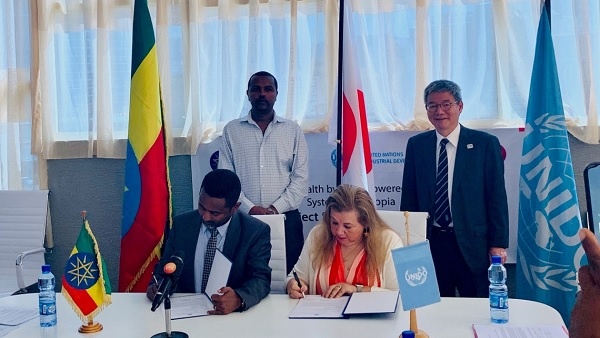
UNIDO and the Water Development Commission of Ethiopia launched a one million dollar project to improve water supply, public health and environmental quality by introducing innovative Japanese water sanitation technology.
ADDIS ABABA (UNIDO) – The provision of clean water to its citizens is one of the most urgent and important issues for the Government of Ethiopia. Economic studies conducted in Africa have shown that impacts resulting from poor sanitation and hygiene cost economies between 0.9% and 2.4% of annual Gross Domestic Product. This figure reflects the a) adverse health effects associated with poor sanitation and water supply, b) costs of treating these health problems, c) loss of productivity that results when individuals are sick and others have to care for them, and d) time spent accessing existing water and sanitation services.
About 60% of Ethiopia’s rural population do not have access to basic water services and, as of 2015, 14% – around 11 million people – relied on surface water for drinking purposes. Climate change-induced water shortages are adding to the problem. Droughts have affected several areas of the country, leading to water sources drying up or becoming extremely shallow over the past twenty years. Between 2000 and 2018, six drought episodes have been recorded, with devastating impacts in rural areas.
Innovative water sanitation technologies have emerged as potential solutions to the challenges at hand and for promoting social equality and economic growth, while also having further positive externalities, including enhanced safety and security, less water pollution, greater dignity and equality between men and women, growth in tourism and business, among others.
Earlier in November 2019, representatives of the United Nations Industrial Development Organization (UNIDO) and the Water Development Commission of the Federal Democratic Republic of Ethiopia launched a one million dollar project to improve water supply, public health and environmental quality by introducing innovative Japanese water purification technology.
The project, “Improving Public Health by Solar-Powered Water Sanitation Systems in Ethiopia”, which is funded by the Government of Japan, will improve the provision of clean water through solar-powered water sanitation systems under conditions of equality and gender equity; develop the technical capacity of communities to independently operate water sanitation systems and improve awareness of public health; and build the capacity of industry, engineering, procurement and construction contractors in order to strengthen their role in Ethiopia’s water and sanitation sectors.
During the signing ceremony, UNIDO Representative and Director of the regional office, Aurelia Calabro, expressed UNIDO’s gratitude to the Government of Japan for its continued support for enhancing the water and energy sectors in Ethiopia. Calabro further emphasized the critical importance of introducing new energy-efficient, water-purifying technologies that are easily adaptable and can sustain communities in need. She has also commended the commitment of the Government of Ethiopia in jointly implementing the project with UNIDO.
His Excellency Dr. Beshah Mogesse, Commissioner for Water Development, highlighted the impact of the project on the ongoing national ONEWASH programme targeting improved health and well-being of communities by increasing sustainable and climate-resilient water supply and the adoption of good hygiene practices.
His Excellency Daisuke Matsunaga Ambassador of Japan reaffirmed the strong dedication of the Government of Japan to strengthen the partnership through the introduction of innovative technology, capacity building and skills transfer.
Source: UNIDO
